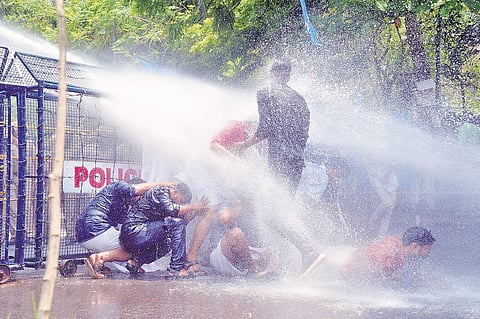

KOCHI: It hasn't been long since Maharaja's College saw blood spilling on its illustrious campus when an active student leader,Abhimanyu, was stabbed to death. While the memory is yet to fade away, campus
politics once again grabs the spotlight, though not in an encouraging way.
While dissecting the history of campus politics, the significance of colleges in the district cannot be ignored. Maharaja's College and Government Law College, Ernakulam, were the breeding grounds of many young leaders, who went on to dominate active politics. The fight for better infrastructure to the right to education and travel (student travel concession) were the fruits of the labour of many students' organisations.But, last year's incident at Maharaja's blew the lid off campus politics and its intricacies. It shed light on the violent nature of many organisations and the recent incident at University College, Thiruvananthapuram, only strengthens the clamour for a ban on campus politics.
Communal forces
Post Abhimanyu's murder at Maharaja's, the Students' Federation of India (SFI) had pointed out the role of communal forces behind the crime. Amal C K, district president of SFI, thinks the ban on student politics on campuses would only create space for communal forces.
“It is the basic right of an adult to propagate his ideology. In the absence of SFI or a similar students' organisation, communal forces would strengthen their grip within the campuses. A year ago, when Jishnu Pranoy, a student with a private college committed suicide alleging harassment from college management, the relevance of SFI was highlighted. This is an organisation which fought for the rights of students. Many benefits which students enjoy today are the fruits of SFI's hard work. An isolated incident like what happened in University College cannot be used against the organisation,“ he said.
According to Amal, the relevance of SFI has only increased after Abhimanyu's death. “During the memorial, we saw students from schools and colleges joining us to pay respects. They believe in the organisation,” said Amal. SFI also believes banning students' organisations would only help gangs and narcotic groups to gain strength.
While SFI dominates most colleges in the district, including autonomous colleges like Sacred Heart, Thevara, Kerala Students Union (KSU) alleges high-handedness on its part. “Every single rule stipulated by the High Court on student politics is being violated in colleges. There is a widespread violation of the right to education here too. Students are forced to support SFI's agenda and any voice of dissent is quelled. The sports quota in every government college is filled by SFI students and the teachers support them. What happens on these campuses is not democracy, but dictatorship," said KSU district president Aloysius Xavier.
Role of teachers
K S Radhakrishnan, former vice-chancellor of Sanskrit University and former PSC chairman, thinks the teachers in government colleges are in a big way responsible for the current state of campus politics. “If this is campus politics, then it has to be banned. Rather than becoming a leading light, the teachers in these institutions help student leaders engage in violence and mass copying. All such activities happen in government colleges where the children of poor study. The situation will improve only when teachers stop supporting such activities,” said Radhakrishnan.